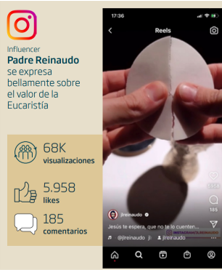Experiential and illuminating masses
Experiential and illuminating masses
1. Catholics in the digital world go to mass. More than 60% go regularly, 16% sporadically. Almost 40% participate in parish activities
2. But many of them find the masses boring That is an important alienation factor on the part of many
3. Sincere, Jesus-centered, heart-moving homilies are called for, avoiding partisan politics
4. A ritual that makes sense and brings the Mystery closer With different accents: happy, solemn, engaged, in Latin But everyone asks to find God there
5. The mass is not mandatory but desired Virtually no one referred to the Mass as an obligation, but rather as a need and a desire
6. Masses on television or digital, an option It will never replace presence, but digital has sustained faith during the pandemic, and many have become used to it
The voice of the participants
«The biggest crisis of the Church is in the failure of the Catholic schools to evangelize. The desecration of the Eucharist in schools is terrifying, since they have turned masses into shows to keep students entertained. But they do not know the importance of the sacraments, nor the grace they can receive through them, nor do they know that they are the image of God. In the end they feel alone»
“Showing the world a joyful Church, but one that does not turn Mass into a circus”
”Short and clear sermons, do not repeat what has been read, rather explain it… Take advantage of wedding ceremonies and acts with sermons that motivate people who only go for commitment to return. They usually leave very upset or disappointed”
“Latin Mass, what harm does it do? It is more solemn and touches the heart”
Missionary Voices
Boring masses?
Sister Xiskya Valladares
Joyful and participated mass
F. Bruno
The infinite value of the Eucharist
F. Reinaudo
The Magisterium, the Gospel
Magisterium
“The Christian faith is either a living encounter with Him, or it is not. The Liturgy guarantees us the possibility of such an encounter. A vague memory of the Last Supper is of no use to us, we need to be present at that Supper, be able to hear his voice, eat his Body and drink his Blood: we need Him. In the Eucharist and in all the Sacraments we are guaranteed the possibility of meeting the Lord Jesus and of being reached by the power of his Easter.
The salvific power of the sacrifice of Jesus, of each one of his words, of each one of his gestures, look, feeling, reaches us in the celebration of the Sacraments.
Source: Apostolic Letter Desiderio desideravi, 10-11
The Gospel
“As they approached the town to which they were going, he made as if to continue on. But they forced him saying: “Stay with us, because it is getting late and the day has already declined.” And he went in to stay with them. And it happened that, when he sat down at the table with them, he took the bread, pronounced the blessing, broke it and gave it to them. Then their eyes were opened and they recognized him, but he disappeared from their side. They said to each other: “Did not our hearts burn within us when he spoke to us on the road and explained the Scriptures to us?”
Source: Luke, 24, 29-34
Results of the questionnaires
How do you participate in the Catholic Church?
Stats
- I attend mass regularly 64,9%
- I attend mass sporadically 15,7%
- I participate in parish activities 39,4%
- I participate in group/movement/congregation activities 41,6%
- I do social volunteering (Cáritas or similar) 15,7%
- I attend prayer groups and retreats 32,8%
- I feel part of the Church without participating in any activity 15,9%
- I do not participate 4%
Almost 2/3 attend mass regularly and 16% sporadically. 40% attend parish activities.
49.183
Surveys analyzed
How to moove forward?
Theological standpoint
The Eucharist is the center of the Christian life, not a mere social encounter; it is a moment of intimate and community prayer around the Paschal Mystery of Christ, and of reflection on him. To live it with meaning, the confluence of two attitudes is required: the knowledge and personal openness of the Catholic faithful to the celebrated mystery, and the authenticity of the faith expressed by the celebrant in the Eucharist. Other elements can help to deepen its meaning: music, the beauty of the environment, etc., which can vary greatly from one culture or circumstance to another.
Moral-behavioural standpoint
Rethink the obligation of the Sunday Mass, which should never be understood as a certificate of sufficiency in “Catholicity”.
Structural and organizational standpoint
The participation of the faithful is important in its different ways, but also sometimes an occasion to let them express some brief personal reflections.
Pastoral-pedagogical standpoint
A pedagogy of the Mass is necessary so that it is not an isolated act of life, but the habitual celebration of an existence lived in faith, hope and charity. At the same time, the Mass can be an opportunity to approach the Mystery of God for those who are still far from Him.


